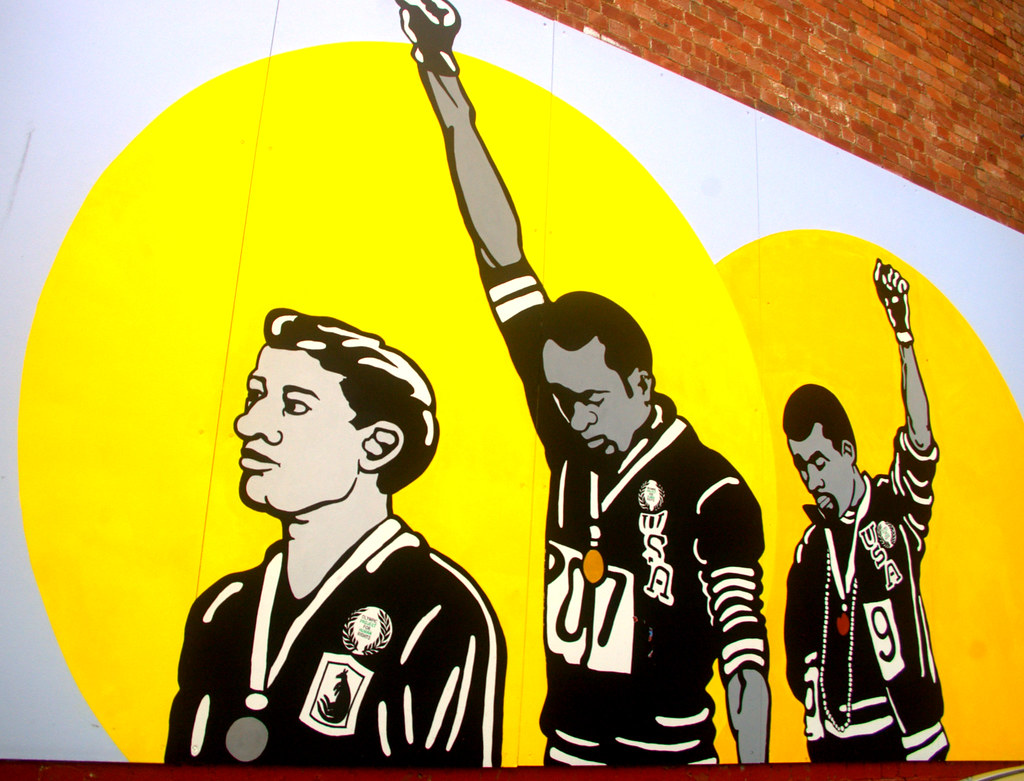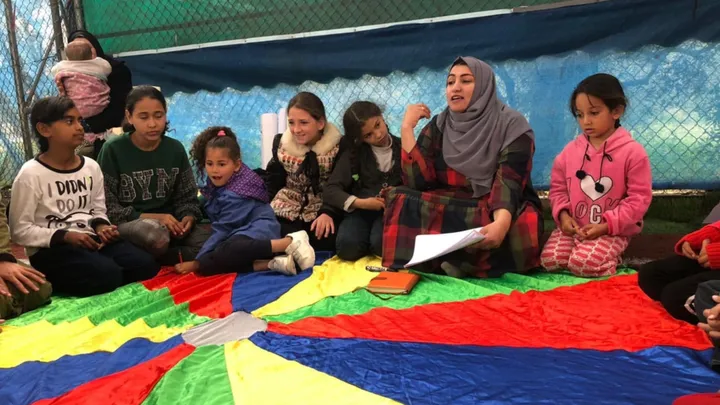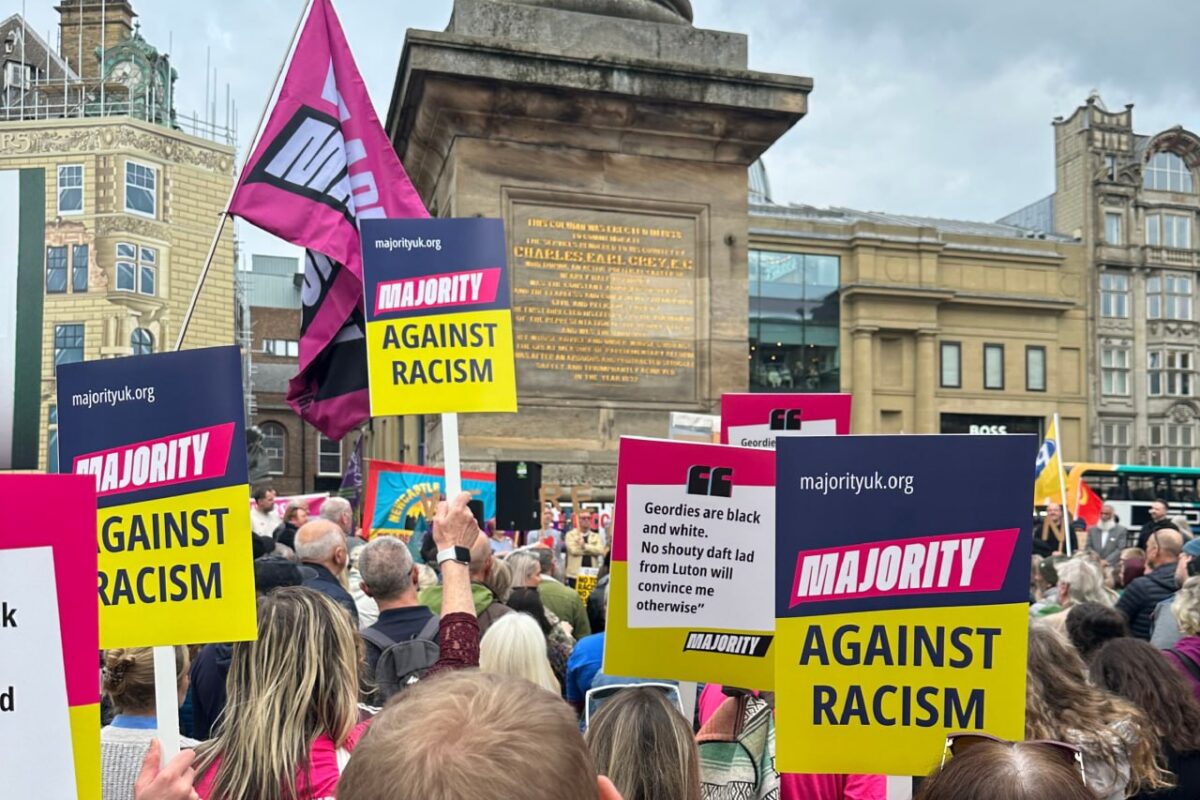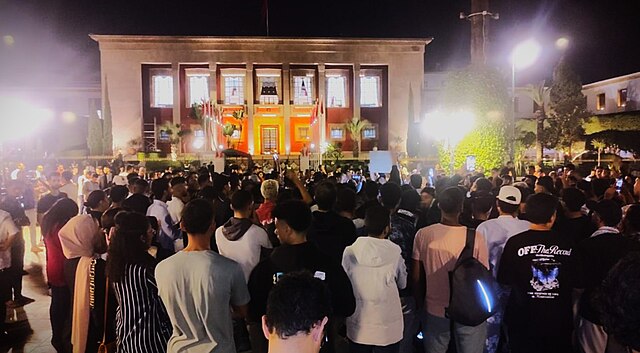Two weeks after the huge far-right mobilisation in London, UKIP leader Nick Tenconi and a ragtag group of about 200 people who like to wear flags, carry crosses, and shout at hotels, hit the streets of Newcastle. Stephen Yaxley-Lennon, aka Tommy Robinson, was a no-show, presumably in court or on a sun lounger in the Med.
Around 3,000 counter-protesters gathered in the city, split between a 400-strong group blocking the far-right on the quayside and the majority rallying at Grey’s Monument.
As I listened to the speeches from community and faith leaders, local politicians and trade unionists, I looked around the sea of placards and flags. The messages of resistance had a distinctly regional flavour –‘Racism? Nah, you’re alreet pet.’ ‘Geordies are black and white. No shouty daft lad from Luton will convince me otherwise.’ ‘Haddaway and shite, fascists.’
One of the speakers was met with a cheer after saying, ‘I’ve never felt safe to proclaim I’m a Mackem in Newcastle city centre until today.’ A historic rivalry dating back to the English Civil War, when Newcastle and Sunderland were on opposing sides, was temporarily set aside and subsumed into a broader regional identity. There were groups from Scotland and Yorkshire all mingling under the numerous Northumbrian flags. Geordies, Mackems and Smoggies (Teessiders) with roots in Mumbai, Dhaka, Guangzhou, Lagos and Ramallah were all gathered in a shared sense of northern civic pride. There were no membership-tests based on skin colour or length of stay. Whether you’d just arrived or had generations of North East heritage, it didn’t matter – if you were here, you were one of us.
This was not just a demonstration against toxic English nationalism; it was a beautiful expression of inclusive regionalism.
The defiant atmosphere reached its peak when a section of the counter-demonstrators rallied outside a hotel housing some recently arrived Geordies from foreign shores. We blocked the far-right from gathering there and eventually sent them back down towards the quayside with their tails between their legs. With police lines drawn, cheeky chants of ‘your English flags are made in China’ rang out across the streets. The mood was jubilant and celebratory; we felt united.
Victory that Saturday afternoon was not always guaranteed, though. A lot had changed since the racist riots and huge counter-demonstrations of summer 2024. Reform had stormed the local elections in the North East, taking control of Durham County Council and making considerable gains in Northumberland. The racists had momentum, emboldened and validated by the Labour Prime Minister’s ‘island of strangers’ speech. Nationally, the rhetoric had ramped up from stopping the boats to mass deportations, with London witnessing the largest far-right rally in history. Just two weeks after that, the good people of the North East stood up and were counted, at a moment that felt significant.
But even as the crowds were dispersing, the recriminations on the Left kicked in. During the build-up, there had been some tension between the various anti-racist groups organising the counter demonstration. On the day, it was clear that some wanted a mass mobilisation to block the far-right at the quayside, while others wanted to keep the rally focused at the Monument. In the end, the crowd split and was spread across two locations. Huge credit to those 400 on the quayside who stood firm, blocking the racists’ route through the city centre. These counter demonstrators were subjected to kettling, with reports of aggressive and violent policing. Ultimately, the result was a victory, but the process was messy and fractious.
Splits on the left are sadly nothing new, with the recent high-profile spats at the top of ‘Your Party’ offering plenty of ammunition to our opponents, whilst draining enthusiasm from our supporters. There is no doubt the process of forming a new socialist party will be messy and fractious; the big question is whether it will ultimately result in victory.
Whilst I don’t want to relitigate the issues surrounding the numerous botched launches of ‘Your Party’, I would say that first impressions count. Those calling the shots have failed to give a positive and reassuring first impression of the project. This doesn’t necessarily mean it will ultimately fail, but it does mean the project will have to work twice as hard to gain the trust of activists and the wider public.
Thankfully, things between Jeremy Corbyn, Zarah Sultana, and their respective teams have de-escalated from threats of legal action. Pursuing that route would have precipitated their mutual destruction in the court of public opinion and strangled the party at birth. Crisis temporarily avoided.
The major challenge will be stewarding the movement into a mass membership party with structures and governance that enable truly democratic decision-making. What emerges must be capable of holding together a broad coalition of ideas and traditions, whilst forging a new form of participatory politics that is not controlled from the centre. It must be decentralised, democratic, but disciplined – politics in 3D, if you will.
When I helped set up Majority in 2024 alongside former North of Tyne Mayor Jamie Driscoll and other highly experienced activists, this is the approach we took. Not aiming to control all activity centrally but to support self-organising groups, people’s assemblies and innovative campaigning. Underpinning this with a code of conduct that mirrors the Nolan principles in public life but can be summed up as ‘play nice and don’t be a dick’. The culture is more important than the rulebook, or to paraphrase T.S. Eliot, we must stop ‘dreaming of systems so perfect that no one will need to be good.’
Our aim is to get more good people into progressive politics and rebuild trust in our democracy. Because the challenge for the English Left is not limited to promoting our policies and capabilities, we must also convince the public that democracy is worth saving. If we don’t, we are building our house on sand.
Outside of ‘Your Party’, there have been some interesting developments on the Left of British politics. We have a resurgent Green Party with over 100,000 members, and in Zack Polanski, they have a popular leader who performs well in the media. We also have Andy Burnham, the only English politician with a net positive approval rating, testing the waters for a Labour leadership bid. Interestingly, neither are MPs, but rather regional politicians – one is a London Assembly Member and the other a Metro Mayor.
In the case of Metro Mayors, English devolution has delivered us a new type of elected representative with significant budgets and executive powers, one that is crucially beyond the reach of parliamentary party whips. Existing regional identities can now be expressed in a form of regional politics capable of flexing its muscles and facing down Westminster, as Burnham did during the COVID-19 lockdowns.
Both Polanski and Burnham have made public ownership a key plank of their political pitches, going much further than Labour in this area. This agenda provides us with a chance to innovate – to plan and manage our public services in a 21st-century context.
Imagine if we did take back control of our water, not as a centrally administered 70s-style nationalised industry, but as a regionally managed public resource. Imagine regional water boards with local politicians, trade unionists, billpayer representatives and environmental groups, all working together as public stewards of our most vital resource. Don’t like the way your regional water board is managing things? Organise and vote them out via a democratic process in a local election, via your trade union, billpayers or environmental group. Sure, it won’t be perfect, but it will be a damn sight easier than getting rid of a private CEO.
It’s not quite Lenin’s ‘every cook should learn to govern’, but with more routes to democratic participation at a local and regional level, we could rebuild our collective civic muscles. When participation is built around a strong regional identity, backed by political structures that actually respond, taking back control becomes more than just a slogan. Or as the Geordies might say, ‘late-stage capitalism. Nah, you’re alreet pet.’
Editor’s note: To learn more about Hugo’s work at Majority, visit their website here.




